Borders, bahias and bananas
Now begins the infamous Central American border crossings. For years a reputation has been passed down word of mouth among adventure travellers. "Be patient." "Negociate prices ahead of time." "Watch your stuff and watch your money." The fronteras can be time consuming, bafflingly complex with scattered offices, bits of paper and stamps (sometimes as many as five for one country) and can be expensive. It should be said the vast majority of border folks are great and work under difficult conditions. And tramitadores, young boys who lead us viajeros (travellers) through the maze, can make life much easier. But there are exceptions. And, as I found out on a Saturday, it can cost when the officials themselves are on the take.The first border crossing was Columbia to Panama. That's where I first discovered the charming habit of one country charging for the privilege of leaving, the other the privilege of arriving.
Next, it's crossing into Costa Rica. That takes a few hours, and other than a lot of waiting and a few bucks, it is painless. I head west into this attractively lush country but aimlessly. At the first Reten Policia (a police stopcheck), the nice officer suggests I head out to Parque Nacional Marino Ballena (as in whales). Not one to argue (well, not every time) with guardians of the law, I head out to the tiny and underdeveloped village of Uvita. There, while idling down dirt "mainstreet", I stop to ask a friendly looking guy where's a good place to stay. That's how I meet Frank Thompson, finca owner and retired geologist from Winnipeg.
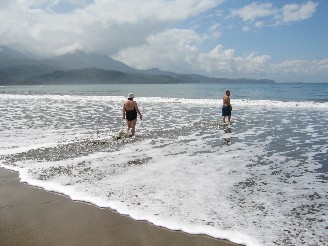
Frank recommends the cheap and clean place he is staying at, "Has a Swedish sound to the name, with a V and a G and an H in it, I think." Camp Helgalva is indeed a fine place for $10 a night, with an open-air restaurant and hammocks strung among the palms.
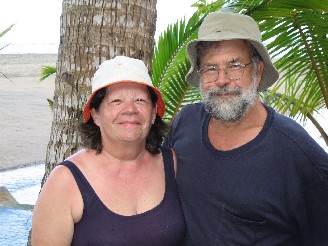
An easygoing lad about my age, Frank owns a comfortable little finca up by San Jose, Costa Rica that kind of grew from a retirement acreage into an interesting coffee plantation. Beans are grown and roasted right on his property. His pal Peggy Malpass is just as upbeat, with a delightful skill as a story teller. Around beers one pleasant evening she describes in compelling detail her trek with 15 other women to a Buddest temple in northern Nepal. How the sunrise burst through the temple windows as the female Buddists chanted morning prayers - I think I was there myself after listening to her story.
When not travelling, Peggy is a prof at U of Ottawa, helping law students learn the finer points of conflict resolution. As well she practises law. I suspect she is pretty damn handy at both.
In the morning we go swimming in the bathtub temperature Pacific. The green jungled hills behind are streaked with black rain. Peggy "manifests" our fate so the storm doesn't drift over to us. It seems to work. I think Miss P would like this woman.
Later Frank, Peggy and I meet some of their friends at La Parcela. To give you an idea of the view from our table, the open air restaurant was built on Sunset Point. To show you how relaxed I've become, I have ceviche as an appetizer and raw tuna for main course, washed down by some nice Chilean Sauv Blanc. When I go to pay for my share of this magical lunch, they insist it is their treat. Thank you, my friends.
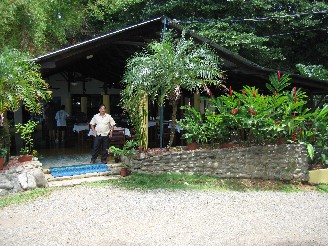
When they leave Uvita, I head out the next day. Travelling along the coast the highway is smooth (very unlike Costa Rica) until Dominical. Then it is two hours of rock, mud, potholes, river crossings then dust to Quepos. But then great pavement again! OK, well, that's what Katie is for.
By late afternoon I'm feeling a bit parched and pull in at a typical Costa Rican roadside diner. The place is eat-off-the-floor clean. The fruit juice is made on the spot, the asado meal equally delicious. Black sky builds while I have dine.
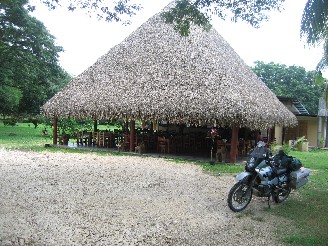
Katie and I work our way to near the Nicaragua frontera to the little town of Los Cruz, Costa Rica. I stay at the Villa Amalia, with a spectacular view overlooking the Bahia de Salinas from my second story balcony. The heavy thunderstorm I arrived in rumbles and booms off to the south. With the streets still steaming I head off to the supermercado for a bottle of wine, some cheddar and nacho chips. Witnessing a sunset from such a special viewpoint as tonite is just too good to miss.
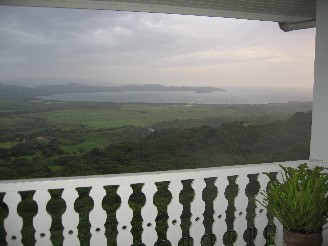
The next day Katie and I jump the border hoops again. Exiting Costa Rica is a bit confusing. I have to ride back a mile to get to the unmarked Aduana building to stamp Katie out. I wait with a bunch of truckers who kindly point out which unmarked office I must enter when it's my turn. We play with the pencils while the ventilador hums.
Crossing no-mans land to Nicaragua, I happily discover their entry procedure is the easiest yet with all three officials sitting side by side. My documents just get handed along. I am liking Nicaragua already.
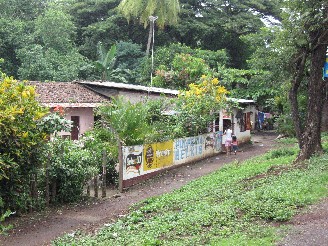
My country for today turns out to be as clean as Costa Rica. But I do notice, as I have from Panama onwards, a definite shift to things english and north american. Besides the charming little stores, like the one above, that are indigenous to latin america, Burger Kings, billboards in english offering condo community living, Castrol Oil adverts, and a surprising number of english speaking latinos are starting to emerge. I find it a bit disappointing that pure latin america, like the old west, just isn't here anymore.
What is still commonplace in these tropical climes are bananas. Lots of bananas. Roadside stalls, on horse drawn carts, strung over bicycle handlebars, loaded to the gunnels of straining camións.
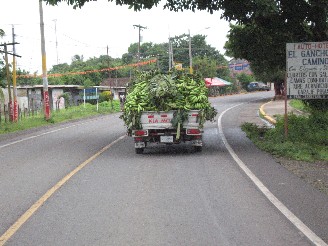
I pass through many small towns or pueblos. Nicaragua seems to have civil and national pride. The common practise in other countries of using the road out of town as the city dump doesn't seem to be as popular here. Thank God for small favours. No matter how often I see garbage strewn around otherwise beautiful landscape I can't get used to it. As Bob Beliesch told me, don't let it get to you or it'll drive you crazy.
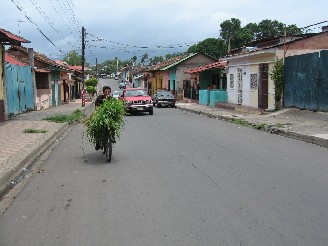
Security in Central America, Costa Rica and Nicaragua in particular, is the square root of what Columbia employs. Not that Nicaragua doesn't have its own entertainment what with the energetic Sandinistas. Typical for here in Granada is a hired security guard with a night stick instead of an automatic. My amigo in the photo below patrols the central plaza.
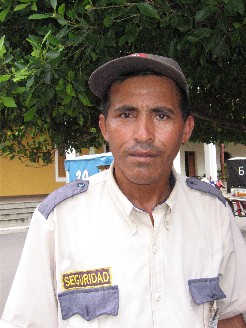
Granada, a lovely city with freshly painted buildings and cobblestone streets, sits on the shores of the expansive Lago de Nicaragua. Population 111,000 half of which must be gringos and ex-pats. Typical of latin america, streets and avenues are unmarked. I take a hospedaje near the plaza then wander around. I discover a small unmarked, unsigned shop making, you guessed it, unmarked cigars (what is it with these people?). Eddie Reyes invites me inside, shows me the five different kinds of tobacco leaf used to make good Nicaraguan cigars. I sniff each leaf dutifully as it's handed to me - geez, there is a distinct aroma to each one! Eddy offers me one of his handrolled coronas, I light it. Kind of strong Eddie, have you got anything mas sauve? He lights a freshly made robusto and hands that to me. Oh wow, now this I like. I'll take a box please. I leave with 25 cigars that would cost well over $200 at home, here they are $38. I like this charming little town. I am so pleased with myself I seriously consider a buggy ride around town. Then think better of it. I need the budget money for beer.
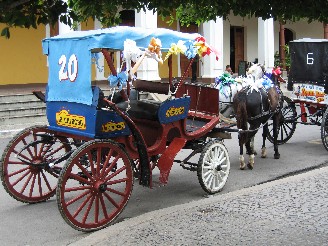
The highways in Nicaragua are a motorcyclist's dream. I realize I am passing far too quickly through these countries, missing adventures, volcanos, Caribbean diving and snorkeling and much more. But I have decided to be in Dallas by the third week in August. I can always came back to the bahias and the bananas. I just have to put up with the borders.
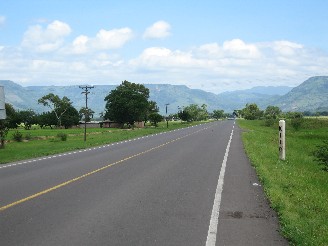
I make the mistake of crossing into Honduras at the lonely border crossing of Las Manos on a Saturday afternoon. By the time the dust settles, they have me for $55. Either that or go back where I came from and wait til Monday. For developing nations, this must be a primary source of income. To quote the Footprint Handbook for Central America and Mexico: "Honduras has had a succession of military and civilian rulers and there have been 300 internal rebellions, civil wars and changes of government since Independence, most of them in the 20th century." Good start to another new country, wouldn't you say, Katie?
